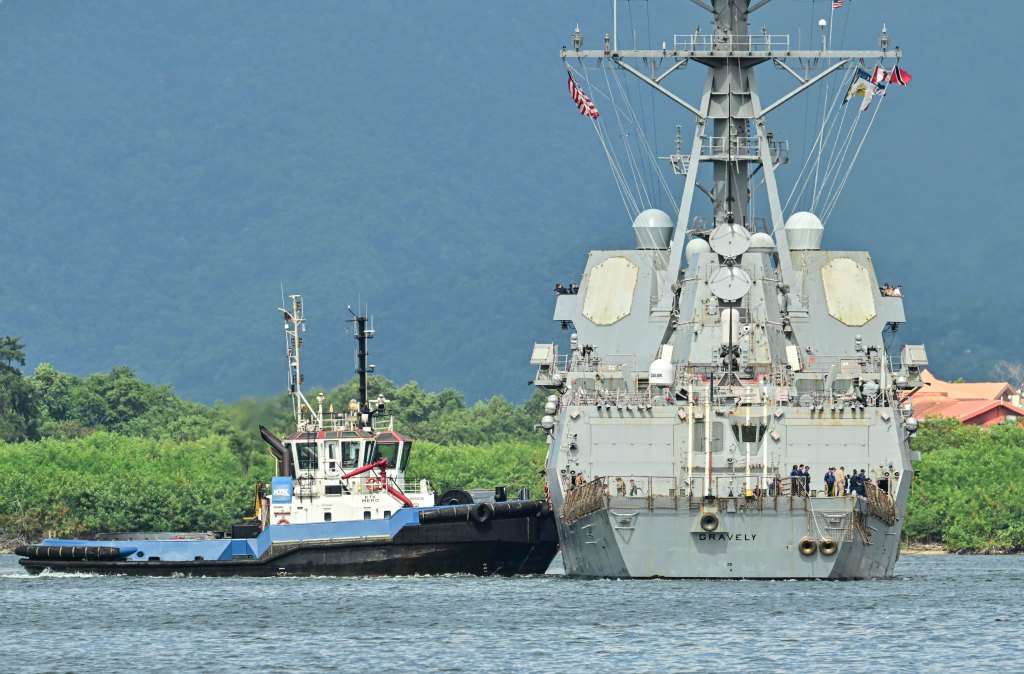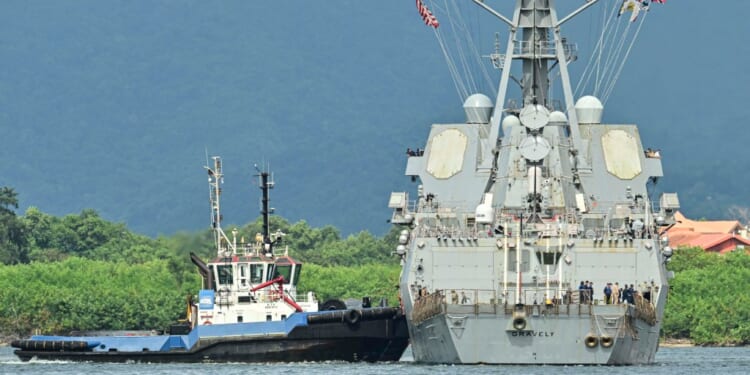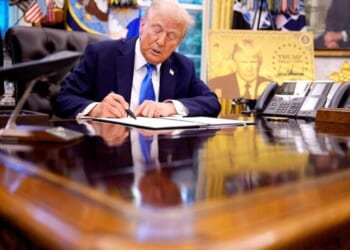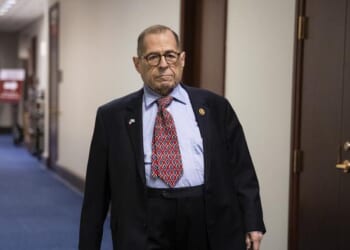
Since the U.S. military launched its first lethal strike on a boat suspected of trafficking drugs off the Venezuelan coast two months ago, the campaign has expanded from the Southern Caribbean Sea to the Pacific Ocean, leaving at least 64 people dead and a few known survivors.
Prominent conservative legal scholars have described the campaign as a violation of U.S. law and the principles of just war, but there is no sign that Congress is about to do anything to put a stop to the campaign, even as the Trump administration contemplates strikes on Venezuelan soil and continues to leave the legislative branch largely in the dark.
On October 8, the Senate rejected a war powers resolution to stop the attacks 48-51 on a mostly party-line vote. John Fetterman of Pennsylvania was the lone Democrat voting against it, while Rand Paul of Kentucky and Lisa Murkowski of Alaska were the lone Republicans voting for it.
Paul has, by a mile, been the most outspoken Republican against the new military campaign from its outset. “I don’t think any part of the Constitution says that you can just go blow people up who you’re not at war with,” Paul told The Dispatch in the Capitol on Wednesday. Even if Congress had authorized a war against drug traffickers, Paul added, “The military still has some standards. … So let’s say we were at war with Venezuela. Typically, people would ask: Who are these people? Are they armed? Are they threatening our troops? Does it look like you’re getting ready to attack? If these guys were pirates and they were riding up to our destroyers with bombs or threatening our ships, we have every right to blow them up. But them speeding along and doing who knows what, there’s no precedent for what’s being done, and it’s not right.”
After the initial strike occurred, Secretary of State Marco Rubio acknowledged that it has been longstanding U.S. policy to interdict suspected drug boats and arrest and prosecute those aboard. But “interdiction doesn’t work because these drug cartels—what they do is they know they’re going to lose 2 percent of their cargo. … Instead of interdicting it, on the president’s orders, he blew it up,” he said.
As Paul has noted, many of the administration’s factual claims about the alleged drug boats are simply implausible. Though Trump has claimed the boats are carrying fentanyl, Paul said in a recent TV interview: “There is no fentanyl made in Venezuela. Not just a little bit, there’s none being made.” (Cocaine and marijuana are produced in Venezuela.) And while Trump has claimed the first boat struck was “heading to the United States,” Paul noted in that same interview, “These are outboard boats that, in order for them to get to Miami, would have to stop and refuel 20 times. They’re in all [likelihood] going to Trinidad and Tobago, which is an island right off the coast of Venezuela.”
The response from other Republicans in Congress has ranged from cheerleading to ambivalent acquiescence. “I hope they do more of them,” Florida Sen. Rick Scott told The Dispatch. “I’m very confident they have the authority to do that,” he added, without specifying exactly what gave the president the legal authority to launch lethal strikes on suspected drug runners. But even some Republican senators who opposed the War Powers resolution have expressed their frustration that the executive branch has withheld information from Congress. “If this was happening with this level of insight [for Congress] under the Biden administration, I’d be apoplectic,” Oklahoma Sen. James Lankford, a member of the Senate Intelligence Committee, said on C-Span on October 23.
“I am highly concerned about the legality of recent strikes in the Caribbean and the trajectory of military operations without congressional approval or debate and the support of the American people,” Indiana Republican Sen. Todd Young said in a statement on October 8. He voted against the war powers resolution due to his concerns that it could extend to operations against terrorists in the Middle East, he said. “We also must think through potential side effects if these actions are prolonged, such as the diversion of resources from the most important threat of our time, the People’s Republic of China,” he added. “Others have noted that, if one thinks of the ‘War on Drugs’ as a real war, it could conceivably lead to an increasingly militarized ‘War on Drugs’ inside the United States.”
Last Wednesday, the Trump administration held a briefing for 12 GOP senators that was requested by Young. A spokesperson for Young told The Dispatch that the senator from Indiana “felt the briefing went well” but declined to share what information was gleaned from the briefing. Senate Democrats were outraged by the partisan briefing that excluded them. “When an administration decides it can pick and choose which elected representatives get the understanding of their legal argument of why this is needed for military force and only chooses a particular party, it ignores all the checks and balances,” Virginia Sen. Mark Warner, the ranking Democrat on the Intelligence Committee, told the New York Times.
Tim Kaine, Virginia’s junior Democratic senator and a member of the Armed Services Committee, told The Dispatch that, over the course of two months, he has received just one briefing from the administration about the strikes, but it provided very little insight into the military campaign. “It was very, very underwhelming,” Kaine said in the Capitol on Wednesday. Asked what evidence the administration provided to Congress that these boats were in fact carrying drugs, Kaine replied: “They’ve asserted that they were [traffickers] without providing evidence. They have not provided the secret list of groups that are able to be attacked based on Donald Trump’s say-so.”
Kaine said he was troubled by a recent report that Pentagon officials have been required to sign non-disclosure agreements regarding the lethal strikes on suspected drug boats. “You wouldn’t do that if you weren’t of a belief that there’s serious division within the ranks about the legality and wisdom of this strategy,” Kaine said. The administration has publicly noted that the missions have been carried out by U.S. military’s Southern Command, but when Kaine asked two dozen uniformed people at the classified briefing if they were with Southern Command, not one did. “When we get a briefing on this mission, and nobody from Southern Command comes, that tells me something.”
On October 16, the head of Southern Command, Adm. Alvin Holsey, abruptly announced plans to resign at the end of the year from a powerful and prestigious post that is typically held for three years. The New York Times reported that although the reason for Holsey’s resignation was unclear, he had “raised concerns about the strikes” on suspected drug boats.
The same day Holsey’s resignation was announced, Southern Command had for the first time conducted a strike on an alleged drug boat that left survivors who had been rescued by the U.S. Navy. “The two surviving terrorists are being returned to their Countries of origin, Ecuador and Colombia, for detention and prosecution,” Trump said in a post on Truth Social. While the Colombian government said it would file drug trafficking charges against the citizen returned to them, Ecuador released the Ecuadorian national upon his return home.
Had the Pentagon given any orders to Southern Command about how to treat the survivors? Is it official policy going forward that survivors of these strikes should be rescued by the U.S. military if possible? The Dispatch posed those questions to a Pentagon spokesman, who simply pointed to a statement by Defense Secretary Pete Hegseth that provided no insight. Earlier this week, Hegseth announced another strike in the Pacific had left one survivor, saying Mexico had taken responsibility for rescue operations. A U.S. official told the New York Times on Tuesday that the survivor had been rescued, but Mexico’s president said the next day that the Navy had failed to rescue the survivor.
Is there anything that can be done in Congress to slow the administration’s escalating campaign against suspected drug traffickers—or simply get the administration to provide more information? “I think just forcing Republicans again and again to have to vote, and every time they have to vote, it makes them wonder: ‘Hey, administration, why don’t you answer our questions?’” Kaine told The Dispatch. “Kind of like the tariff [issue], I think there’s a building concern.”
New Jersey Democratic Sen. Cory Booker called on the American people, as well as the American media, to do more to demand accountability. “The press seems to write more articles about the tearing down of the East Wing [of the White House] than extrajudicial killings and the severity of that,” Booker told The Dispatch. “We all have an obligation in democracy to speak up.”

















